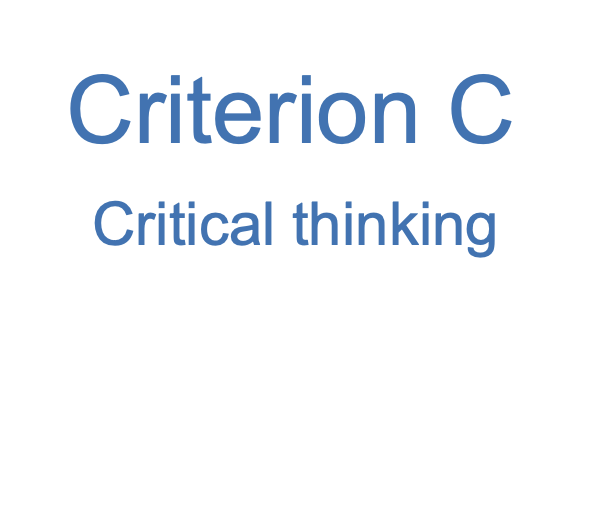Criterion C

Criterion C focuses on research, analysis, discussion and evaluation. This page details what is required to gain maximum marks and lists some of the common errors made by students when addressing this criterion.
Criterion C: Critical thinking (maximum mark 12)
Strands
This criterion focuses on four main strands (although the IB puts discussion and evaluation together).
1. Research – appropriate to research question & relevant
2. Analysis – clearly focused & effectively supported
3. Discussion – reasoned argument, well structured & coherent
4. Evaluation - contains a reflective conclusion supported by evidence
The assessment is based on the extent to which you have used critical-thinking skills to analyse, discuss and evaluate the research you have undertaken.
Specific points covered
Specifically the assessment considers:
1. Are the selection and the application of the research presented both relevant and appropriate to your research question?
2 Are the sources/methods used appropriate in terms of how you have used them in the development of the argument you have presented?
3. Is your analysis of the research effective and focused on your research question?
4. Does your discussion of the research develop a clear and coherent reasoned argument in relation to your research question?
5. Have you critically evaluated the arguments you have presented in your essay?
6. Are there any unlikely or unexpected outcomes which also demonstrate critical thinking?
Level 10-12 descriptor
How you have addressed each of the specific points above then determines the mark out of twelve to be awarded. The level descriptors are given on pages 104 and 105 of the Extended Essay Guide. To achieve the highest mark band of 10-12 the assessor must be satisfied that you have properly and competently addressed each of the main strands:
The research is excellent.
i.e. Your research is appropriate to your research question and its application is relevant throughout.
The analysis is excellent.
i.e. Your research is clearly focused on the research question and is analysed effectively. Any less relevant research that
you have included does not detract significantly from the quality of your overall analysis.
Your conclusions to individual analysis points are properly supported by the evidence presented.
The discussion and evaluation are excellent.
i.e. Your research is supported by a focused and effective reasoned argument with a conclusion that reflects the evidence
presented.
The reasoned argument that you have developed is well-structured and coherent. Any minor inconsistencies present
do not hinder the strength of your overall argument or detract from your final or summative conclusion.
You have critically evaluated your research.
Excellent use of terminology and concepts
i.e. You have made accurate and consistent use of concepts and terminology relevant to both chemistry and the topic
which demonstrate effective knowledge and understanding.
Some common errors made by students
Some common reasons for not attaining Achievement level 12 for Criterion C: Critical thinking include:
- Making unsubstantiated and sweeping claims in the discussion.
- Deviating from the research question.
- Giving straightforward descriptions or narrative accounts rather than an argument.
- Giving unnecessary and trivial details which detract from a logical sequence.
- Not looking for flaws or weaknesses in their argument.
- Not considering different approaches or counter-arguments.
- Not questioning the reliability of sources quoted.
- Not including the uncertainties associated with all aspects of an experiment.
- Not questioning underlying assumptions made in arguments.
- Basing conclusions on single (not reproduced) results.
- Introducing new material into the final conclusion.
- Not presenting evidence in the final conclusion that is consistent with the evidence in the body of the essay.
- Omitting quantitative values in the final conclusion.
- Not relating the conclusion directly to the research question.
- Suggesting facile or unrealistic areas for further investigation.

 IB Docs (2) Team
IB Docs (2) Team